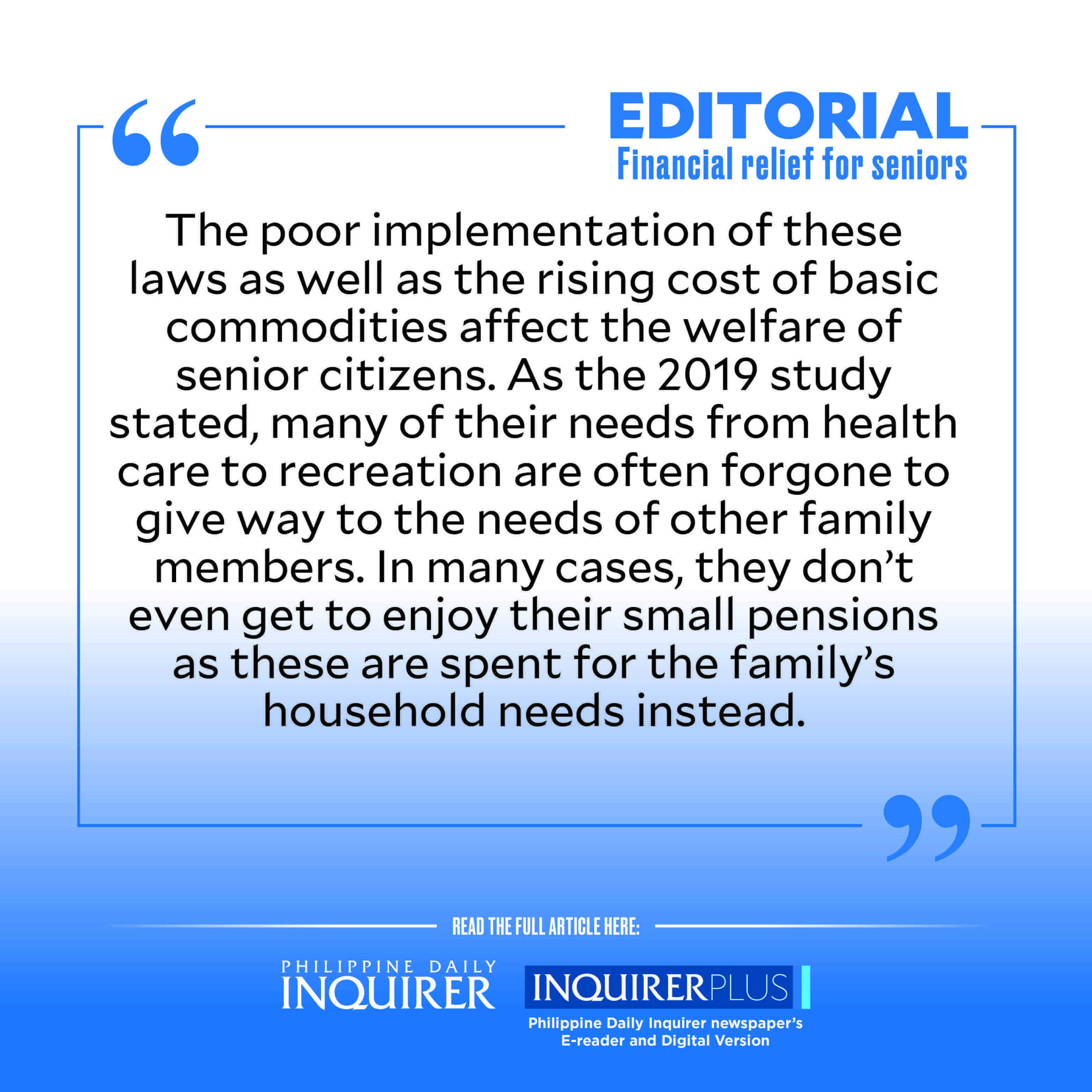Financial relief for seniors

Every peso counts in these inflationary times. That’s why the recent increase in the special weekly discount in basic goods extended to senior citizens brings much relief to our graying population.
While this benefit is not as grand a gesture as the newly signed measure granting P10,000 to Filipinos who reach the age of 80, 85, 90, and 95, it covers the more urgent need of helping ease the monthly financial burden on senior citizens amid the rising prices of basic commodities.
The nearly 100-percent increase is also granted to persons with disabilities (PWDs) and will take effect this month. The Department of Trade and Industry is expected to issue a memorandum circular on the increase that brings the monthly discount to P500 from P260. This amounts to a P125 weekly discount for senior citizens and PWDs, an amount that while may not be substantial considering the steep increase in the prices of goods and services, can still help them meet their most urgent necessities. It can buy them at least two kilos of rice a week.
4 million indigents
Aside from rice, the discount also covers basic commodities such as bread, meat, fish, chicken, eggs, cooking oil, sugar, vegetables, fruits, onions, and garlic. The discount also applies to fresh and processed milk, except medical grade milk, as well as processed meat and sardines.
Based on the 2020 census, there are 9.22 million senior citizens in the country but recent estimates show they have reached more than 12 million. Of this, there are about 4 million indigents who have no regular income or support from family and relatives, and without pension from private or government institutions; they are covered by the Social Pension for Indigent Senior Citizens (SPISC) Program, which started in 2011 through Republic Act No. 9994 or the Expanded Senior Citizens Act of 2010. This law provided a P500 monthly assistance for their daily expenses and medical needs until it was amended in July 2022 doubling the monthly allowance to P1,000.
Universal pension system
The study, “Unmet Needs and Coping Mechanisms Among Community-Dwelling Senior Citizens in the Philippines,” conducted in 2019, pointed to the need for a universal pension system that will benefit everyone regardless of economic condition. Other countries like our Asean neighbors Thailand, Vietnam, and Brunei have been cited as examples of successful universal pension systems in the region. This system, however, is not without problems or controversies. Recently, there was a highly criticized move in Thailand to amend the so-called old-age allowance, which provides pension to everyone depending on age, over fears that it is unsustainable. Calls have been made to extend the privilege only to the poor, quite similar to our SPISC, which advocates in Thailand rejected for being non-inclusive.
One-time cash payouts
It is notable that the Marcos administration has pushed for various initiatives that benefit the senior population and it would help to look at other countries’ experience in helping senior citizens. More needs to be done beyond one-time cash payouts such as the expansion of the Centenarian Act, signed into law by President Marcos this week. But it turns out that the law, which expands the centenarian act that provides incentives only to those who have reached 100 years old, can only be implemented next year since it has not been appropriated under this year’s budget.
Aside from regular financial assistance, it would benefit senior citizens even more if the government sees to it that laws providing privileges such as the 12-percent VAT exemption and 20-percent discount on goods and services are strictly implemented. Three months ago, a senior citizen was forced to file a complaint against a hotel in Metro Manila that tried to go around the law and refused to grant a discount. Recently, a coffee shop went under fire over a policy that limited discount privileges for seniors. Many more similar cases are probably under the radar of the public because senior citizens would rather not assert their rights to avoid trouble or are not fully aware of the laws that cover them.
Small pensions
The poor implementation of these laws as well as the rising cost of basic commodities affect the welfare of senior citizens. As the 2019 study stated, many of their needs from health care to recreation are often forgone to give way to the needs of other family members. In many cases, they don’t even get to enjoy their small pensions as these are spent for the family’s household needs instead.
All the more important that the government must find the means to fund social benefits and ease the financial burden of our senior citizens the way it can move mountains to spend for other budgetary items such as huge confidential funds. This is the least the state can do for those who have spent their younger years contributing to society and their families to live a more comfortable life in their old age.




















